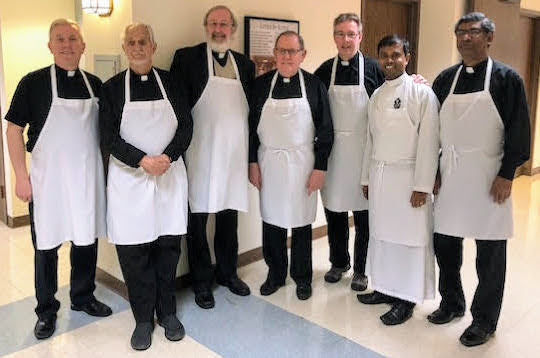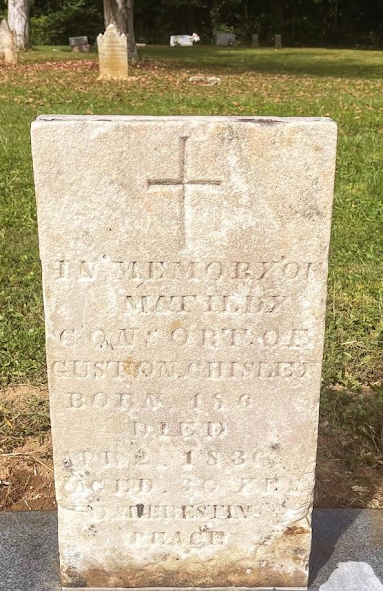Saturday, January 21, 2023
Thursday, January 19, 2023
LITTLE SISTERS OF THE POOR: ONE OF MY RETIREMENT MINISTRIES
In my retirement, I have taken on several new ministries. I help out every week at either (1) St. Leonard Church or (2) Saint Frances of Rome Church and sometimes at both on the same weekend. (3) I have been working on building a new Family Life Center in our old grade school at my home parish of St. Theresa in Rhodelia. (4) Every week, I have Mass once or twice a week at the local St. Joseph Home for the Aged operated by the Little Sisters of the Poor just down the street from my condo.
You can see we cleaned off and reset Matilda's stone. Compare this photo to the moss-covered one in the picture above which is leaning terribly.
Tuesday, January 17, 2023
MY REFLECTION ON THE BASICS OF SPIRITUAL LEADERSHIP
“Beware of false prophets, who come to you in sheep’s clothing, but underneath are ravenous wolves.” Matthew (7:15) reflects a problem of St. Gregory's own time, bad leadership even in the early church. Even today, not all who seek spiritual leadership in the church do so for the best reasons. Some are motivated by money and some are motivated by a need for the approval and the respect of others. Failing to understand or acknowledge the scars of their own past, some end up being more motivated by anger than by love, and still others seek positions of spiritual authority as a means of personal edification rather than an avenue to serve God.
“The quality and strength of one’s motivation are vital to any lifelong vocation. The temptation to seek priesthood motivated by power, privilege, status and security or to create a feeling of identity can be strong. Other effective motives would be to seek such forms of self-enhancement as comfort, exhibition or unearned affirmation. Likewise are the desire to do social work, to make a reparation for an alcoholic father, to satisfy maternal expectations, or to cover up a confused psychosexual life. None of these deficit motivational patterns will sustain one for a long time.” (Rev. Desmond O’Donnell, OMI, “The Anatomy of a Vocation,” Seminary Journal, NCEA, Winter 2003)
Emotionally needy people are especially drawn to the status and practice of ordained ministry. Since it takes humility and vulnerability to do so, some never examine what lies behind their desire to be a leader and are driven by unnamed demons. For this reason, the Church should take great care to screen out needy people who don’t understand who they are or who have no insight into their own motivations. If not, their neediness can derail even the best parishes in a very short time. This neediness can manifest itself in an insatiable need to be the focus of attention and affirmation, an authoritarian leadership style, hasty liturgical changes based on their personal preferences, an inability to listen and a disrespect for what has been done before their arrival. Most, thank God, are driven by a genuine desire to do God’s work.
The church today craves and needs good leaders, but at a time when society at large is displaying a growing interest in spiritual issues, there is an acute shortage of real spiritual leaders. The problem is not with people willing to present themselves as leaders, in fact “At the heart of America is a vacuum into which self-appointed saviors have rushed.” (Warren Bennis, ft 2 in Blackaby) People are so desperate for leaders that they are susceptible to following destructive and delusional gurus, would-be messiahs, almost anyone who promises miracles, signs and wonders and those who claim to know the truth, the whole truth and nothing but the truth. Most, however, simply endure and wait-out run-of-the-mill incompetents, many of whom are arrogant as well as ignorant.
The first caution for beginners in “spiritual leadership” may be: “a designated leader, may or may not be, “a real leader.” People seem to know intuitively that claiming to be a leader or holding a leadership position does not make someone a leader. Even seminaries are bewildered that so few real leaders are emerging from their graduating classes. Designated leaders are not necessarily real leaders. God’s call and ordination makes one a designated leader, but whether one becomes a real leader is additionally a matter of intention, skill and practice. Good will is not a substitute for competency. A true leader has the ability to unleash the power of individuals and direct it toward the goals of the community. The Good News, and its communication through word and deed, is what spiritual leadership is all about. Indeed, an ordination, a collar and a title do not necessarily make one an effective spiritual leader. Indeed, the best scenario is when a designated leader is also a real leader.
One of the most painful lessons I had to learn as a new pastor was having the title of a leader did not necessarily mean that I was, in fact, a leader. I had accepted the title of pastor, but I was ambivalent and unprepared for all that a pastor of an important and visible church like a cathedral needs to be. As a result of my indecision and lack of focus, the associate pastor “took charge” and left me in the dust. Our constant clashes came to a head one day when one of the musicians screamed out at a tense meeting, “The trouble around here is that we have two “pastors!” It hit me like a ton of bricks: I had the title and the associate had the power. Instead of being angry at him, I decided to step up to the plate and commit myself to becoming a pastor not just in name, but also in fact.
The second caution for beginners in “spiritual leadership” may be: “know thyself.” Father William Moorman, coordinator of spiritual formation at St. Luke Institute, a treatment center for priests says this about some of our leaders-to-be, as spiritual leaders “we are entrusted with the unique responsibility of embracing the sacred intimacy of another’s spiritual life. Can this be possible if we are unable to embrace the mystery and the sanctity of our own identity? Too often candidates are looking for the identity of priests/religious as a vicarious personal identity, which is always a formula for disaster. Most often these individuals insist on external order to balance their internal chaos, and they never achieve the inner peace they long for in their spiritual lives. Spirituality for such persons reside outside themselves in spiritual practices, as opposed to embracing the mystery of God, others, and self.” Any formation program for “spiritual leaders” must assume reasonably integrated individuals, but Father Moorman notes that because of the shortage of seminarians, screening and formation programs are accepting and tolerating candidates with demonstrable personality traits such as dependency, avoidance, narcissism, and obsessive/compulsive behavior. (Pp.36-37 HUMAN DEVELOPMENT, vol, 27, no. 2 summer 2006) Priesthood, even today, offers seductions of power, prestige and flattery. This attracts those who are drawn to the status and practice of ministry along with their need to be the focus of attention and affirmation. This focus becomes even more pernicious if it is couched in the religious language about being servants.
Saint Gregory the Great, in his remarkably applicable work “Pastoral Care,” warns of those who “investigate spiritual precepts with shrewd diligence…but teach what they have learned, not by practice, but by study, and belie in their conduct what they teach by words.” As if writing about recent events in our church, he observes, “For no one does more harm in the Church than he who, having the title or rank of holiness, acts evilly.”
He goes on to warn those who enter into ministry with a divided heart, “The mind cannot possibly concentrate on the pursuit of any one matter when it is divided among many. It is as though it were so preoccupied during the journey as to forget what its destination was; with the result that it is so great a stranger to the business of self-examination as not to be aware of the harm it suffers, or to be conscious of the great faults it commits.”
Saint Gregory the Great, again with remarkable application to today’s reactionary young priests, warns of those “who…busy themselves with a variety of inquisitions, more than is needful, and fall into error by their excessive subtlety.” Fools rush in where angels fear to tread. Rather, he says, “When the ruler prepares to speak, he must bear in mind to exercise a studious caution in his speech, for if his discourse, hastily given, be ill-ordered, the hearts of his hearers may be stricken with the wound of error, and when perhaps, he wishes to appear wise, he will by his lack of wisdom sever the bond of unity.” Many unseasoned new pastors have done great damage to the church in their zeal for, but limited understanding of, “orthodoxy and truth.”
The third caution for beginners in “spiritual leadership”
may be: “Nemo dat quod non habet.” “No one gives what he does not have.” Saint
Gregory Nazianzus put it another way. “Before purifying others, they must
purify themselves; before instructing others, they must be instructed; they
have to become light in order to illuminate and become close to God in order to
sanctify.” Indeed, as Father Howard P.
Bleichner wrote, “Lofty prose is easily mouthed.” It is easy to recite high ideals, but very
difficult to live them.
A fifth caution for beginners in “spiritual leadership” may be: It’s not about you!” It has always been true for newly ordained priests, but one of the many downsides of a priest shortage is that the traditional “headiness” that comes with ordination is being exacerbated. Newly ordained priests and priests-to-be are so often “made over” and “focused on" during their days in the seminary and especially during their ordinations and “first Masses” that they begin to feel special, maybe too special. This powerful surge of special treatment can, unmonitored, lead quickly to the cocksure arrogance of clericalism and entitlement. As Pope John Paul II put it, priests are not above the laity or alongside the laity, but for the laity. It’s not about us, but them!
The best advice to those who want to prepare themselves for
“spiritual leadership” is to insist that they do serious inner work to see if
they have the “right stuff” to practice the art of arts, to be physicians of
the heart. Otherwise, they ought to be arrested for false advertising or
dismissed as a menace to the People of God, even if they do mean well.
Monday, January 16, 2023
THE PASSING OF A SELFLESS WOMAN OF FAITH
Here she is with Bishop Gerard County waiting for the plane that would take her into retirement at her Carmelite Motherhouse in Trinidad. She was very sad that day to go off and leave her kids and her home in SVG. As sad as she was that day, I hope she knew in her heart of hearts all the good she had done while serving in SVG.
Watch the Caribbean Carmelite Funeral of Sister Zita here.
Sunday, January 15, 2023
CALLED TO BE A CONDUIT
















